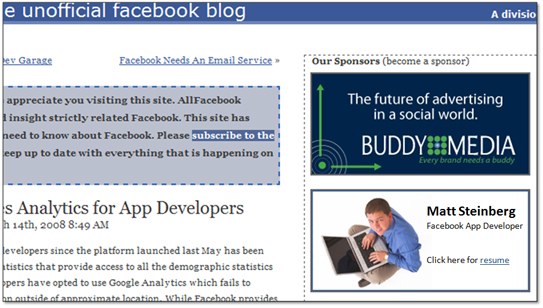I’ve been seeing a lot of personal branding creativity out there lately. People have started to experiment with using Google AdWords and Facebook Social Ads, as a way of advertising their personal brand. I think it’s not only creative, but since most people have never thought of using these strategies, they stand out BIG TIME. Yet again, this proves that we must act like our own company’s, which sometimes means we have to pay the price.
The good news is that advertising on Google and Facebook is quite cheap and you have complete control how much you spend per day, week and month. Today, I want to go over how to effectively use Google and Facebook to advertise your brand (not by building a profile or ranking high in natural search) and then pitch you a way to advertise on blogs! You become a passive candidate when using all 3 mediums.
Remember that this is a two-way street, meaning that employers and applicants can use both strategies to their own advantage.
1) Google AdWords

Google AdWords is Google’s advertising platform, which offers CPC (cost-per-click) and CPI (cost-per-impression) pricing for advertisements on Google and partner sites. Some of their partner sites are newspapers, radio and TV now.
Before running your advertisement, you need a landing page. If you have a website or blog, then use the resume page within it to display through advertising. This works beautifully because recruiters can see that single resume page and notice all the other pages/options on your website, to getting a better sense of your brand.
Creating your ad
- 1) Title. When you create your ad, label yourself as a specialist, expert or guru on the title tag. You might want to state the fact that it’s your resume first.
- 2) Description. In the next two description tags, pull out your biggest achievements in 6 words or less and list your personal brand statement or a few descriptors.
- 3) URL. For your URL, don’t use the URL for your resume page. Instead use yourname.com for personal branding purposes. Although in the example above (picture), I use www.yourname.com, I think you should drop the “www.” completely because people get the point.
It’s keyword selection time. My friend Jim Stroud, the HR Evolution Columnist for Personal Branding Magazine, says to use Overture to find popular keywords. You should be very specific with your keywords, such that you narrow the focus on the type of job you want to be recruited for, rather than a general position. Think of an industry or an open position you might have seen recently and build it around that.
If you’re a recruiter, then please see Jim Stroud’s blog post on how to use Google AdWords to source candidates.
2) Facebook Social Ads
Willy Franzen inspired this entire post after he tweeted me that he wrote a post on a Facebook Social Ad experiment for job seekers. He has the results of his experiment, which doesn’t quite yet prove the success of this campaign, so I wait to hear back from him, hopefully in a subsequent blog post.
Facebook Social Ads allow businesses and individuals to advertise using Facebook’s news feed or left rail (will change to 2 ad spots on the right when the new interface swaps over). This program works similar to Google’s but you can use a picture and it’s more “word-of-mouth friendly” because ads travel through the news feed of friends.
Creating your ad
- 1) Title. What is the ad for? The title is the most important piece of your ad because it has the most “text” emphasis. I would say “I want to work for <insert company name>” or “Resume for <insert position type>.” Try and be as specific as you can.
- 2) Picture. Just like your Facebook picture, don’t use a picture that you wouldn’t want shown to your future employer. I would go for a professional yet personal picture.
- 3) Description. Don’t write your resume, but instead give the viewer a quick description of who you are, what you do and what job you want in 25 words.
Once you create your ad, either link it to your Facebook page, LinkedIn profile or blog/website. These ads are all about targeted a specific group that would care about your resume or hiring you for that matter. When you select your target audience, keep your major in mind, as well as the company and location.
2) Blog Ads
Aside from promoting Jim and Willy’s ideas, I had to add something to this conversation. I believe advertising your brand on blogs is another strategy for promoting your brand. I’m going to use Nick O’Neill’s blog to explain what a blog ad could look like. Please note that I edited a screen shot of his blog to get the point across.
Just like with Google and Facebook, when advertising on a blog, you get what you pay for. The blogs with the most traffic and subscribers will charge the most but you may get the highest return if you’ve targeted correctly. In the example below, Matt Steinberg is a Facebook App Developer advertising on the #1 unofficial Facebook blog with a link to his resume. This is perfectly targeted and effective (I think Nick would agree).
I would use the same strategies as you did with Facebook and Google. Use your professional picture, maybe a graphic from your professional portfolio and of course you want to point out that the recruiter will get your resume if they click the ad.

So why pay for advertising?
Well for one thing it shows that you are VERY serious about getting a job and it also is evidence that you have some web knowledge. Let me know if you try any of these and please report back.






